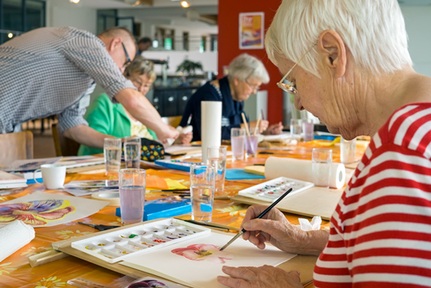Care home residents need a 'sense of purpose' and here's why
Care homes are being urged to tailor activities to each individual resident, after researchers found residents can often lose their sense of purpose when they move into a care home.

Researchers from Manchester University interviewed 15 residents from four care homes about what their purpose in life meant to them, what gives them a sense of purpose, the extent to which they would like to engage in more purposeful activities and how care home staff can help or hinder this.
They found residents experience a loss of a sense of purpose when entering a care home and say it is down to care home staff to create a more “tailored” approach to activities to help win it back.
Dr Laura Brown told carehome.co.uk: “Activities tailored to the resident’s previous life work best. For example, someone who did sewing for people in the past but had a loss of function, the activity coordinator should be creating a craft activity so they can help other people and that will help them create their sense of purpose.”
’Care homes can be quite transitory’
The research showed residents found it hard to make friends and social connections in care homes because a lot of residents have cognitive problems making it difficult to have conversations.
However, the dynamic can change if care home residents are "framed with helping other residents".
"If they feel they can help someone with dementia, it’s a benefit for both parties as they both have a feeling they are useful to that person."
People's sense of purpose and their identity is often bound up with their job role or their position in their family. When this changes as they get older and their children leave home and they retire, they can feel lost and adrift.
“The loss of job roles for some people can be quite difficult because it is such a big part of their lives and a big part of their sense of purpose. When they transition out of that, it can be quite challenging," said Dr Brown.
Dr Brown looked at research from care homes where residents are given a job and found it can improve their quality of life.
This can be gardening or DIY or in some cases if a care home has chickens, looking after the hens.
However she says: “But this is not common practice at the moment and the problem is when you have a workforce who are very time precious, it has to be built into the culture of the care home as an important part of people’s care."
It is also important to bear in mind that having a 'job' in the care home will not be for everyone. Dr Brown added: “A couple of people surprised us by saying they were happy not to have responsibility anymore and were quite happy to be waited on.”
’We set up a tuck shop and asked her if she would help’
Andrea Lyon, manager at Oak Springs Care Home care home based in Liverpool believes it is down to every member of staff to “go above and beyond” to ensure the residents feel they have a sense of purpose.
“Each of the residents on admission has a meeting with one of our activities co-ordinators who completes a ‘this is me’ document. This captures lots of information regarding hobbies and interests, likes and dislikes and incorporates it into a plan of care.”
Ms Lyon says it is important the team encourage residents to take on jobs or find an activity that is worthwhile to them if that’s what they wish to do.
“We had one resident who used to run her own sweet shop, so we set up a tuck shop and asked her if she would like to help us run the shop, completing stock takes, ordering and serving customers.
"Some residents tend to feel a sense of loss and desertion from their home surroundings and families."
During her research, Dr Brown found routine was very important to the residents of care homes.
“The residents found structure helpful to find their sense of purpose. Routine can give us all a sense of purpose because it helps people feel connected to the wider world and community.”
Ms Lyon has also found residents enjoy consistency.
She says: “If someone says they used to always enjoy calling at the pub after work for a pint on the way home, we will go above and beyond to make this happen.
“I feel it’s a sense of knowing what is going to happen, we get round this for example if it's bingo every Friday, however we do not carry out the same kind of bingo each week, we will change the context of the bingo, or exercise classes will vary, from yoga, meditation, and chair exercises.”

’Now is an opportunity for care homes to help support residents’
Regarding making residents dreams come true by taking them to see their favourite football team or jumping out of an aeroplane, Dr Brown says the staff should ask themselves “are these short term activities purposeful to the residents?
“In terms of making it more purposeful, I think if someone was going to jump out of an aeroplane, I would say if they can have a few weeks beforehand doing some training or planning so it gives them a sense of direction and purpose for the event.
"Afterwards, they could tell people about their experiences, have photographs taken, give talks to a local paper, these allow them to gain a lasting purpose to the activity."
Earlier this year, Dr Laura Brown, Dr Rebecca Owen and Professor Katherine Berry from the Division of Psychology and Mental Health at the University of Manchester were given a gold award 2022 in the category of ‘Health and Well-Being of Senior Living Residents’ for their study.
The Mather Institute, based in America, invited submissions by researchers from universities and organisations around the world for this year’s awards, which cover a variety of categories from Aging in Place to Technological Advancements for Older Adults, and beyond.
Dr Brown said: “I was absolutely delighted as were the other two colleagues because it meant our work had some important messages that can help care homes to support the residents and this award has given us that platform to do this.
“The research will not only be read in Britain but will also be read in America so will get a really good wide profile”.
click here for more details or to contact Sandstone Care Group
Latest News
 29-Jul-24
Dementia Bus gives carehome.co.uk staff insight into life with dementia
29-Jul-24
Dementia Bus gives carehome.co.uk staff insight into life with dementia
 01-Mar-24
Find out the top care homes in 2024
01-Mar-24
Find out the top care homes in 2024
 21-Mar-23
UK's top care homes in 2023 revealed
21-Mar-23
UK's top care homes in 2023 revealed
 03-Jan-23
carehome.co.uk launches free care helpline
03-Jan-23
carehome.co.uk launches free care helpline
 13-Dec-22
5 mins with Emily Whitehurst, chief operating officer for Constantia Healthcare
13-Dec-22
5 mins with Emily Whitehurst, chief operating officer for Constantia Healthcare